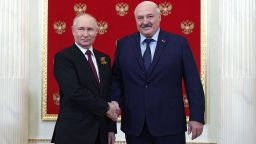Editor’s Note: Frida Ghitis, a former CNN producer and correspondent, is a world affairs columnist. She is a weekly opinion contributor to CNN, a contributing columnist to The Washington Post and a columnist for World Politics Review. The views expressed in this commentary are her own. View more opinion on CNN.
Russian President Vladimir Putin did his best this week to make the case that he is firmly in control of Russia, but within 24 hours after he spoke on Tuesday to the leaders of China, India and other members of the Shanghai Cooperation Organization (SCO), the reality on the ground told a different story.
In a disturbing coda to his diplomatic push at the SCO summit, the Russian capital appeared to come under attack, with Russian officials saying they shot down several drones in the outskirts of Moscow, but not before being forced to briefly close down the airport.

Then there was the news that the mercenary chief of the Wagner Group, Yevgeny Prigozhin — Putin’s former friend who led a dramatic insurrection less than two weeks ago and was supposed to have moved into exile — was back in Russia.
Belarussian President Alexander Lukashenko confirmed the reports from Russian media, saying Prigozhin was back in St. Petersburg and had left Belarus, where he was supposed to stay according to the terms of an agreement with Putin, which now appears to be in limbo.
The Russian president needs to restore his image of a man in full command of his country to audiences at home and abroad. The SCO meeting was meant to boost that effort before both audiences, but the results, combined with the recent headlines and developments on the ground, are pulling the rug out from a man who is used to swaggering on it.
The SCO, a China-led bloc designed as a counterweight to US-led groupings, seemed like an ideal forum for Putin’s first international appearance since Prigozhin’s mutiny. Putin survived what was the most serious challenge to his 23-year rule. But his aura of self-assured invincibility evaporated in the process.
With his unprovoked invasion of Ukraine triggering economic sanctions and global isolation, it has become vital for Putin to convince Chinese President Xi Jinping, Indian Prime Minister Narendra Modi and other SCO members — including its newest one, Iran — that he is still charting Russia’s future.
China’s, and to a lesser extent, India’s purchases of Russian oil have financed Russia’s costly attempt at military expansion in Ukraine. Iran has provided drones, and India, a major buyer of Russian weapons, has subtly undercut the West’s narrative in developing countries with its ambivalent stance, refraining from acknowledging that Putin has tried to conquer Ukraine, a move that reeks of imperialism.
Speaking at the summit, Putin tried to reinforce the message he had delivered to the Russian people, the claim that all Russians had stood with him. “The solidarity,” he said, “was clearly demonstrated by Russian political circles and the entire society by coming out as a united front against the attempted armed rebellion.”
The reality, however, was quite different. Prigozhin claimed his men faced no resistance as they captured Rostov, a major city bordering Ukraine in the west, took over the military headquarters there and then marched almost unopposed to within 125 miles of Moscow. The Russian people stayed home. Some joked about getting popcorn to watch the crisis unfold.
It wasn’t just his use of “alternative facts” that undermined Putin’s effort to leverage the SCO summit into a place to restore his standing as Russia’s czar for the foreseeable future. While the event was a high-level meeting, it lost much of its diplomatic muscle when the host, Modi, decided to hold it virtually, instead of bringing the leaders to New Delhi.
If able to make his case in person, Putin would have spoken at length with Modi, Xi, Iranian President Ebrahim Raisi and others. That, instead of a swift three-hour on camera gathering, could have helped strengthen ties.
An in-person meeting would have also provided the images that turn international diplomacy into domestic power. Instead of images of Putin raising a glass alongside other world leaders, shaking hands with other strongmen, audiences who could muster an interest in the event could see the familiar, uninspiring boxes of a video call.
Not that Putin would have been prepared to travel. As rulers throughout history have learned, a propitious time for a coup is when the leader is away.
In fact, in the aftermath of the Prigozhin uprising, Putin has echoed the traditional strongman’s playbook of buying loyalty. He moved quickly to boost salaries and weapons supplies to the wide variety of security forces that surround him. He even took the extremely rare step of wading into a crowd in the southern Republic of Dagestan to meet (presumably handpicked) supporters.
At the same time, he is continuing to wrap himself in a personal protective shield.
The cartoonishly long conference tables he used to keep Covid-19 away are not as visible, but he still reportedly requires several days of quarantine before he allows some of those who meet with him to approach. And he has a special service, the Biological Safety Centre, making sure his food is not poisoned, according to a defector from the agency responsible for his security.
To survive, however, Putin needs more than safe food, a Covid-free environment and loyal security services. He also needs to rebuild his image.
Persuading Asia’s giants that he remains the mighty leader of a powerful nation is also crucial. And that project is faltering.
Just after the summit — curious timing — a leak from China confirmed that Xi personally told Putin not to use nuclear weapons in Ukraine when he visited Moscow in March, according to the Financial Times. Kremlin spokesman Dmitry Peskov said he couldn’t confirm the detail and called all other reports of Xi’s visit to Moscow “fiction.”
The news comes at a time when Russia and Ukraine are accusing each other of plans to target the Zaporizhzhia nuclear power plant, which is currently occupied by Russian forces. It’s hard to imagine Ukraine deliberately spreading radiation in territory it is fighting to retake. At the same time, Russia has a history of blaming others for incidents it creates, as false flag attacks.
Russia’s diplomatic efforts in Asia are also facing pressure from the US, which has launched a simultaneous campaign of its own. India’s Modi was just honored in Washington with a state dinner and a speech to Congress. And the US is working to contain the deterioration of relations with China. Secretary of State Antony Blinken visited Beijing last month. Treasury Secretary Janet Yellen is there this week.
Putin now faces a triple task: reclaiming the mantle of invincibility in Russia, rebuilding that image abroad and winning his calamitous war in Ukraine. None of these challenges existed before February 2022. They are problems of his own making. Like never before, all are wondering how long Putin can stay in power.


